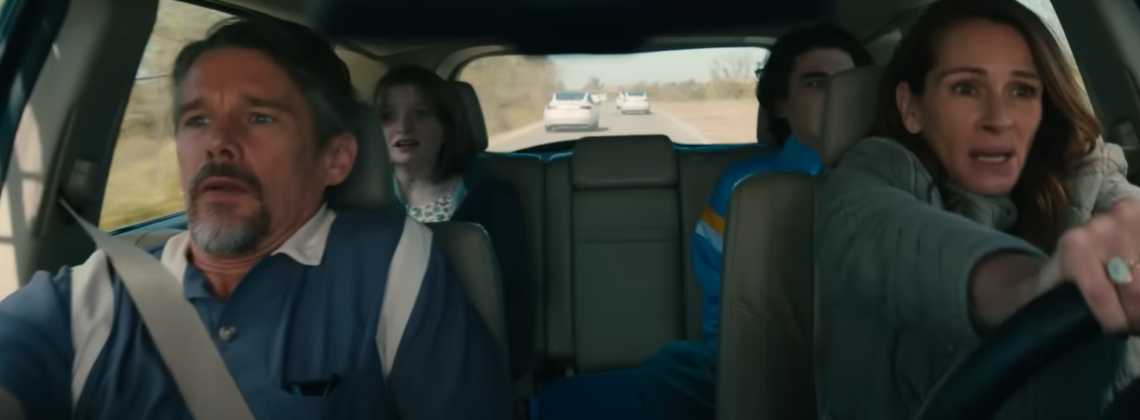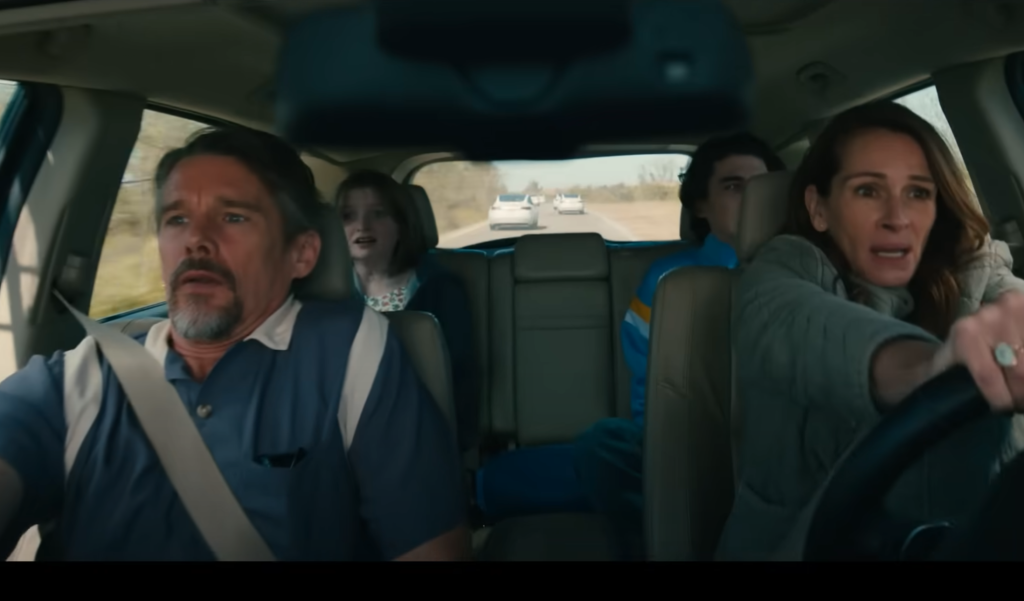

Life together—it may just be worth a try
Yesterday I finished Netflix’s dystopian drama Leave the World Behind. I’m thinking about it as I sip my tea and curse the blare of chain saws and mariachi music from next door. Our neighbors are building something large in their backyard. A storage unit? An airplane hanger? The cacophony pulses through the cracks in our drywall. It pounds past my eardrums, overwhelms my frontal cortex, and squeezes my amygdala until the last drop of patience is strained away. Now I sit here like Scrooge with a cup of Earl Grey, remembering that just a month ago I took those people Christmas cookies.
Well, at least the world’s not falling apart yet. Leave the World Behind is about what happens when you’re mad at people and then everything else goes to hell. For reference, think of the last three years, and perhaps the next five. The series opens with Amanda Sandford (Julia Roberts) telling husband Clay (Ethan Hawke) that she hates people. She’s so tired of New York that she’s rented a nice house in a nearby “hamlet” where they can immediately retreat with their kids for a short vacation.
Amanda and family are soon frolicking in someone else’s territory. Archetype alert! We all know what happens to Goldilocks. Sure enough, the owners of the house return, a Black father and daughter, G.H. and Ruth Scott (played by Mahershala Ali and Myha’la Herrold). Due to a widespread power outage the Scotts can’t get to New York as planned and they need their house back. Amanda, immediately suspicious, doesn’t hide her racist assumptions: “You’re the owners?” Who knew Black people lived in hamlets? Given the troubles of the world, the Sandfords and Scotts agree to share the house for the night, but Ruth Scott, younger and less conciliatory than her father, is bitter. She points out the irony of a Black family staying in the basement of their own home.
People see different things in this film. There’s plenty to dislike—clunky dialogue, ludicrous plot lines (why do the Sandfords make a beeline to Starbucks after escaping death-by-runaway-ship on the beach?) Conservative commentators have fussed about the anti-white subtext. Because, you know, white people not wanting to give resources back to their original owners . . . when did THAT ever happen?? If you’re a Republican, you may think it’s a bad sign that Barack and Michelle Obama produced Leave the World Behind. If you’re a Democrat, you may believe they’re telegraphing vital messages to you about how to avoid the end of the world.
Whatever its drawbacks and whatever conspiracy theories it spawns, the film has some interesting things to say for America in 2024 and beyond. First of all, when our technology fails us, our best hope lies in our shared humanity. As the Sandfords try to leave the hamlet, they run into a pileup of autonomous cyberhacked Teslas. With nowhere to turn they return to the Scotts. And though they really don’t deserve it (Clay has earlier refused a ride to a desperate stranger), they receive hospitality. G.W. takes them in out of basic human decency rather than any personal affinity for them. This is a nod to the ancient cultural imperative of welcoming strangers. The lesson is that if our technology turns against us, or simply erodes, our human connections will be vital to survival. Shouldn’t we nurture those connections?
Second, connecting takes work, and it’s not straightforward. In a country—a world—as fractured as ours, neighborliness rarely feels instinctive. What do I owe my neighbor, and how do I even figure that out now that I don’t know where to contact Emily Post? (Does Siri know?) Also, who IS my neighbor, anyway? The guy with the loud music next door? The woman at my church wearing a MAGA hat? I’m not feeling it. Most of the time it works well enough to aim for being a “nice person” or following the Golden Rule, but when I face a crisis that pits my instinct for self-preservation against the moral imperatives of hospitality and generosity, I’m likely to lock the pantry.
Frank Capra’s It’s a Wonderful Life wasn’t popular when it premiered in December 1946. Critics preferred a darker and timelier movie, The Best Years of Our Lives, with its empathetic portrayal of soldiers trying to get their lives back after the trauma of war. IAWL seemed sentimental and shallow in comparison. But in being a fairy tale Capra’s film had an advantage. It echoed older stories of visiting angels and spirits, locating itself both in the present moment and outside of it. In succeeding generations, 1940’s America itself began to look like a fairy tale on film, and George Bailey became the mythical “little guy” defending his world against monsters. He isn’t a perfect character, but his unselfish choices remind us of all the real people who keep our world by putting the good of others ahead of their own interests.
Christ taught in the parable of the Good Samaritan that being a neighbor is not a tribal or geographical connection but a thing we do. For me, it’s hard to know what I would do in a crisis. For instance, what happens if I don’t like the way politics go in the next ten months? Will I be a George Bailey, a G.H. Scott? Will I continue to show care and hospitality to people in the “other tribe”—even stay at my evangelical church and teach Sunday School to the children of tyrant-enablers? Or will I be an Amanda Sandford and look for a nice hamlet (read: place for people like me) where I can leave it all behind?
The thing is, nowadays you can’t leave. Not that you ever could: People who run away have always brought their worst problem, themselves, along for the ride. But in 2024 you can’t even pretend to do it. This world (this house) is now a very small place, and my happiness and security are dependent on the happiness and security of the others who share it. From a Christian point of view, I should love my neighbor or else. From a self-interested point of view, I must love my neighbor or else.
Well, I’ll tryyyyyy. But I’ve never been good at doing what’s in my own best interest, even when it’s the thing that interests me the most. Meanwhile, hold my tea. The neighbors are knocking at the door—looks like they brought a cake.
M. Elizabeth Carter is a counselor and writer living in Alabama.
Image: Netflix